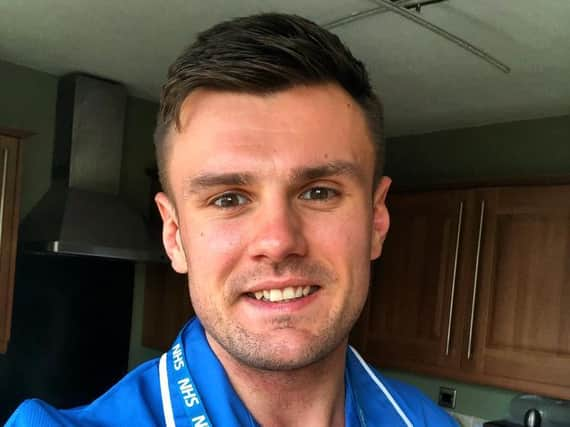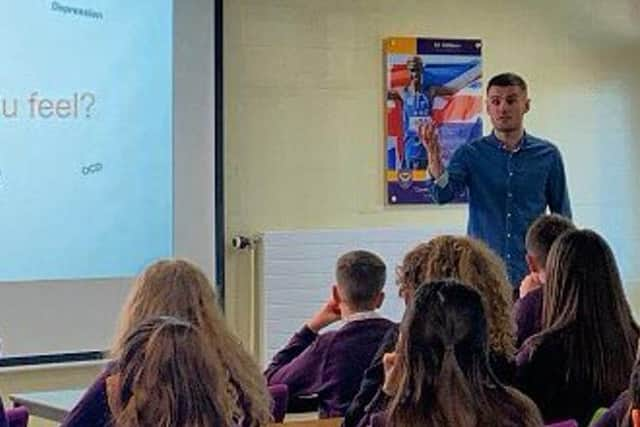'We can’t have mental health without ‘men’: a nurse on why men opening up is more important than ever


With the Covid-19 pandemic still having a detrimental effect on our daily lives and isolation being a key factor, Sam Tyrer tells us why talking is key.
Sam, a registered nurse who has moved into Prevention and Engagement for Lancashire and South Cumbria NHS Foundation Trust, knows all too well about the ‘lad’s lad’ image that is still hanging heavily over men’s health:
Advertisement
Hide AdAdvertisement
Hide Ad“When I was in high school, I was ‘the lad’. I was the confident one. I never struggled with my mental health and to be honest, I never thought I would. I played both rugby and cricket to a high level. Which in turn, got me accepted into a 6th form college as I didn’t do very well in school. Once I left high school and entered college, that’s when everything changed.”


Sam went through a series of events which dramatically impacted his mental health. Through losing people extremely close to him under difficult circumstances, he ended up suffering with depression and anxiety.
Sam lost the motivation to continue with sport, to focus on his A-levels and in his own words ‘gave up’. He gained six stone in weight and for four years of his life, felt that he had achieved nothing.
Four years after Sam had begun to struggle, it was after one conversation he turned his life around.
Advertisement
Hide AdAdvertisement
Hide AdSam has long since moved on from those days and though he has lost the weight, he has gained a new perspective on men’s mental health and a new career through his project Change Talks.
Sam graduated with a 1st class honours degree in adult nursing, is a master’s student and has been invited to do a TedTalk at the London 02 arena. His main focus now is preventing mental health issues.
“With Change Talks, I have visited schools across Lancashire and South Cumbria, talking to teenagers about mental health and trying to connect with them.
"I want to ensure no-one feels how I used to feel. I never have a bad class, no-one misbehaves; as soon as you start telling your story, they just want to listen and if they need, to share things themselves.
Advertisement
Hide AdAdvertisement
Hide Ad"It’s been the most powerful work for me too; the other week a girl in one of the classes came up to me in the supermarket and hugged me and told me what a difference it had made to her. It makes you reflect. The aim now is to embed this education across Lancashire and South Cumbria’s schools.”
As someone who has been through a mental health journey and has come through better for it, Sam wants us all to embrace that part of ourselves.
“It’s important to embrace this part of you, both in the sense that you need to nurture it as well as not keep hiding it away. It may never go away completely but you can use it in a more positive way.
"Make sure to keep doing the things you love where you can, whether that’s DIY, painting, writing or walking around local beauty spots.
Advertisement
Hide AdAdvertisement
Hide Ad"Talk to the important people in your life like your parents, your brothers, your sisters, your mates.
"We’re all going through a difficult time and you may genuinely not know what another person is going through even if you’ve known them for years.
"As sad as that is, it is also what makes talking so important, especially right now. Our feelings are important and we often forget that to our own detriment. We can’t have mental health without ‘men’.”
Since the Covid-19 pandemic, Lancashire and South Cumbria NHS Foundation Trust has taken action to extend the hours of their mental health listening line to 24 hours a day, 7 days a week to ensure that anyone who just wishes to talk or who feel lonely has someone to talk any time, day or night on 0800 915 4640.
Advertisement
Hide AdAdvertisement
Hide AdThe Trust has also established a 24 hour helpline for anyone seriously struggling with their mental health so they can talk to clinicians anytime for help.
They can be contacted on 0800 953 0110 so that even if you feel alone, there is someone there for you, something Sam would have benefited from as a younger man.